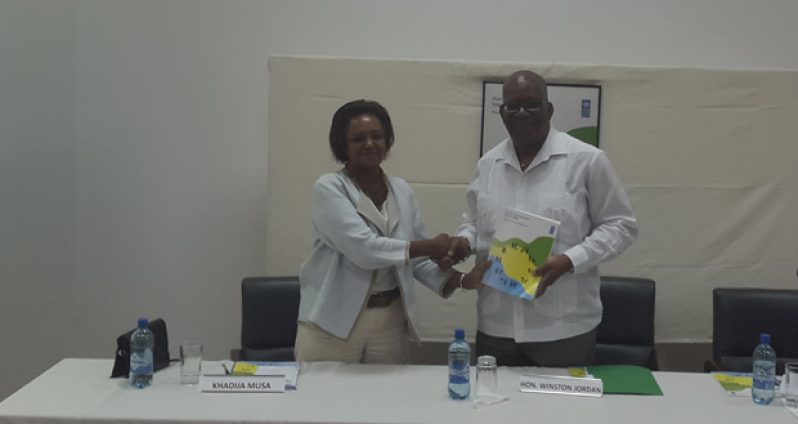With Guyana ranked 124 of 188 countries in 2015 Human Development Report, Finance Minister Winston Jordan acknowledged that there is much work to be done, but pointed out that the administration is focused on improving this country’s ranking by 2020.He made the announcement at the launch of the Report prepared by the United Nations Development Program (UNDP).
The launching was held at the Arthur Chung Conference Centre, Liliendaal, East Coast Demerara under the theme ‘Work for Human Development’.
The 2015 report urges governments to develop policies that boost benefits and minimise the risks and challenges of an evolving world of work.
Minister Jordan said that, a quarter of a century ago, when the Human Development Report was launched, it used the level of GDP as an indicator both of a country’s performance and the wellbeing of its people.
“In this was access to health, education, housing, and basic social amenities were to be priorities and (be) supported by increased official developmental assistance,” he said.
The current people-centred focus is indeed a paradigm shift from the former focus. Defining development by its impact on people is even more relevant today, Minister Jordan said.
He said the UN and its affiliated bodies and various representatives across the globe need to be more proactive to ensure that the multi-dimensional nature of poverty translates into a multi-dimensional assessment of development.
He explained that the classification of countries into groups such as low- or middle-income must be examined in this light, so that their graduation does not reverse the gains made in the national development process.
“Indeed, not only does the theme of the 2015 Report: ‘Work for Human Development’ bring into sharp relief the benefits accrued to individuals from being employed, but it also examines other types of work not acknowledged in the traditional work sphere. These include care work, voluntary work, and creative works such as writing or painting, which now need to be considered,” the Finance Minister highlighted.
He said such non-traditional contributions allow human beings to develop and reach their full potential.
“It is this perspective that will act as a cornerstone of sustainable development, and will reply on the individual having expanded choices and opportunities for paid work. Exercising these choices will create a better world for our people for generations to come,” Minister Jordan posited.
He, however, lamented the prevalence of unemployment in Guyana among youths, which he said stands at a 40 per cent.
UNDP Resident Representative Khadija Musa said the report comes at a time of major changes in the world of work, affecting when, how, and where people work.
Noting that the population of older people is growing rapidly worldwide, Meusa said that, by 2050, people older than 60 will, for the first time in history, be in number equal to those younger than 15.
“Societies worldwide are rethinking the role which older people play in the workforce, and exploring whether the retirement age should be raised,” she said.
“Globalisation and the Digital Revolution are continuing to gather speed. There are now as many mobile phones’ subscriptions – seven billion – worldwide as there are people,” Musa underscored.
She explained that even though people are healthier and better educated, and a much smaller proportion are living in extreme poverty that ever before, major inequalities and challenges continue to prevent some groups of people from entering the work force.
She said the report gave particular attention to the most vulnerable in society, including those who mostly are unfairly treated in the labour market. They include child labourers, trafficked workers, forced workers, workers who operate under hazardous conditions, and women.
Many jobs will need to be changed if countries are to make progress on building emissions and climate resilient futures. These changes will help determine what the labour market of tomorrow looks like, she declared.
“Certain jobs, like renewable energy production, will grow in number. Other work will need to change, such as some methods of agricultural production. Other jobs will disappear altogether over time,” she predicted.
“Countries will have to confront political, social and economic challenges as these changes take place,” Musa explained.
One of the many burning issues in the report, she said, was establishment of a new social contract between state, society and private sector to improve social protection to ensure that all members of society, especially those working outside of the formal sector, have their needs taken into account in policy formulation.
“This new global Human Development Report is an urgent call to tackle one of the world’s great development challenges — providing enough decent work and livelihood for all. We at the UNDP hope that the report will generate dialogue and debate on the challenges identified, as all previous reports have done,” Musa posited.
The launching event was attended by members of the Cabinet, the diplomatic corps, special invitees and UNDP representatives, amongst others.
By Rabindra Rooplall












